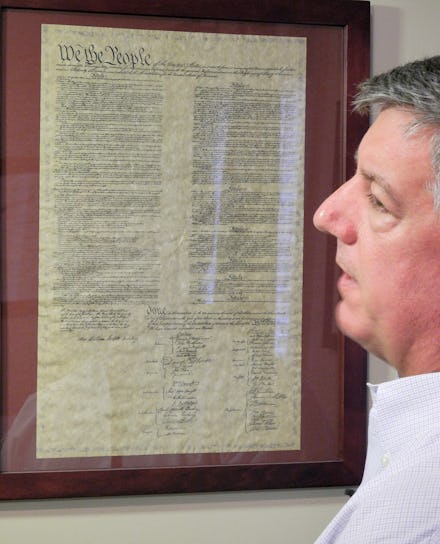225 years ago the Bill of Rights was signed. Here's how it is under attack from Trump.

On Sept. 25, 1789, the First United States Congress proposed 12 amendments to the Constitution. On Dec. 15, 1791, 10 of the 12 amendments were ratified by three-fourths of the legislatures. Ratified Articles III through XII constitute what we know today as the Bill of Rights, or the first 10 amendments of the Constitution.
Two hundred and twenty-five years later, the ideals held by the Bill of Rights have been constantly under attack by President-elect Donald Trump. Khizr Khan, during his speech at the Democratic National Convention in July, asked Trump if he had ever read the U.S. Constitution, alluding to Trump's call to ban Muslims from entering the U.S. Trump replied with the following statement:
"Mr. Khan, who has never met me, has no right to stand in front of millions of people and claim I have never read the Constitution, (which is false) and say many inaccurate things."
The very same statement represents Trump's lack of understanding of the Constitution itself. As Vox reported, telling Khan he has no right to say Trump has not read the U.S. Constitution "in front of millions" curtails his freedom of speech, one of the first rights outlined in the Constitution's Bill of Rights. So it begs the question: Has Trump ever read or understood the U.S. Constitution?
In addition to his rant against Khan, these are the number of times President-elect Trump has attacked the Bill of Rights.
1. First Amendment
In the wake of the November 2015 Paris attacks, the then-GOP presidential candidate told Fox News that the U.S. had no choice but to close mosques where "some bad things" are happening, Politico reported. "Nobody wants to say and nobody wants to shut down religious institutions or anything, but you know, you understand it. ... We're going to have no choice," Trump told Sean Hannity on Nov. 17, 2015. His comments enter in direct conflict with the First Amendment, which protects the freedom of religion and prohibits laws that interfere with the free exercise of religion, also known as the Free Exercise Clause.
Trump has also announced that he would propose restrictions on the First Amendment's freedom of the press. In February, Trump said during a rally in Fort Worth, Texas, that he would change libel laws so that it would make it easier for him to sue news organizations such as the New York Times and the Washington Post. The First Amendment says that Congress should not prohibit the free exercise of the press.
2. Fourth Amendment
Trump has been a staunch supporter of "stop-and-frisk." During the first presidential debate in September, moderator Lester Holt told Trump stop-and-frisk "had been found unconstitutional," but Trump replied by saying it had not. While the practice is not unconstitutional, U.S. District Court Judge Shira A. Sheindlin ruled that the New York Police Department's stop-and-frisk practice violated the Fourth Amendment, which protects people against unreasonable searches and seizures, requiring that a warrant must be judicially supported by probable cause. Stop-and-frisk proved to be a measure that profiled African-Americans and Hispanics, but Judge Sheindlin ruled that NYPD could still perform stop-and-frisk practices as long as there was a reasonable basis for suspicion.
3. Eighth Amendment
Following a terrorist attack in Istanbul that killed 41 people in June, Trump asked an Ohio crowd: "What do you think about waterboarding? I like it a lot. I don't think it's tough enough." He added, "So we can't do waterboarding, but [terrorists] can do chopping heads, drowning people in sealed cages ... you have to fight fire with fire." The comments drew criticism from Sen. John McCain (R-Ariz.) and former CIA director David Petraeus, according to the Hill.
The Eight Amendment prohibits the use of cruel and unusual punishments, such as torture and intentional infliction of pain. As Politico reported, Trump's comments on waterboarding and attacks against family members of terrorists are meant to use punishment as vengeance, rather than torture intended to gather intelligence.